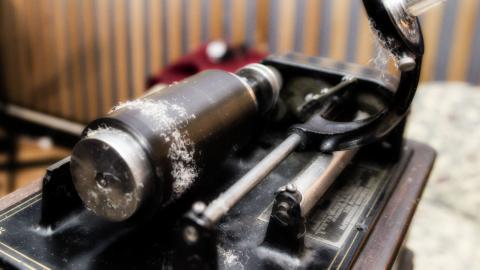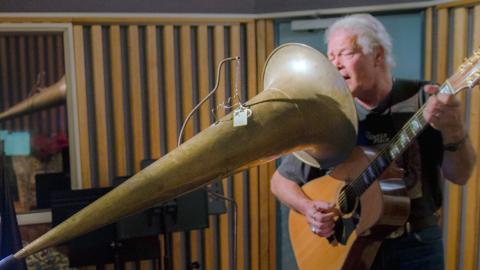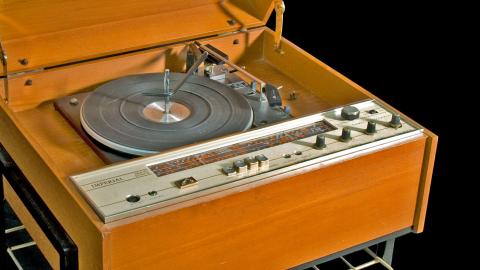
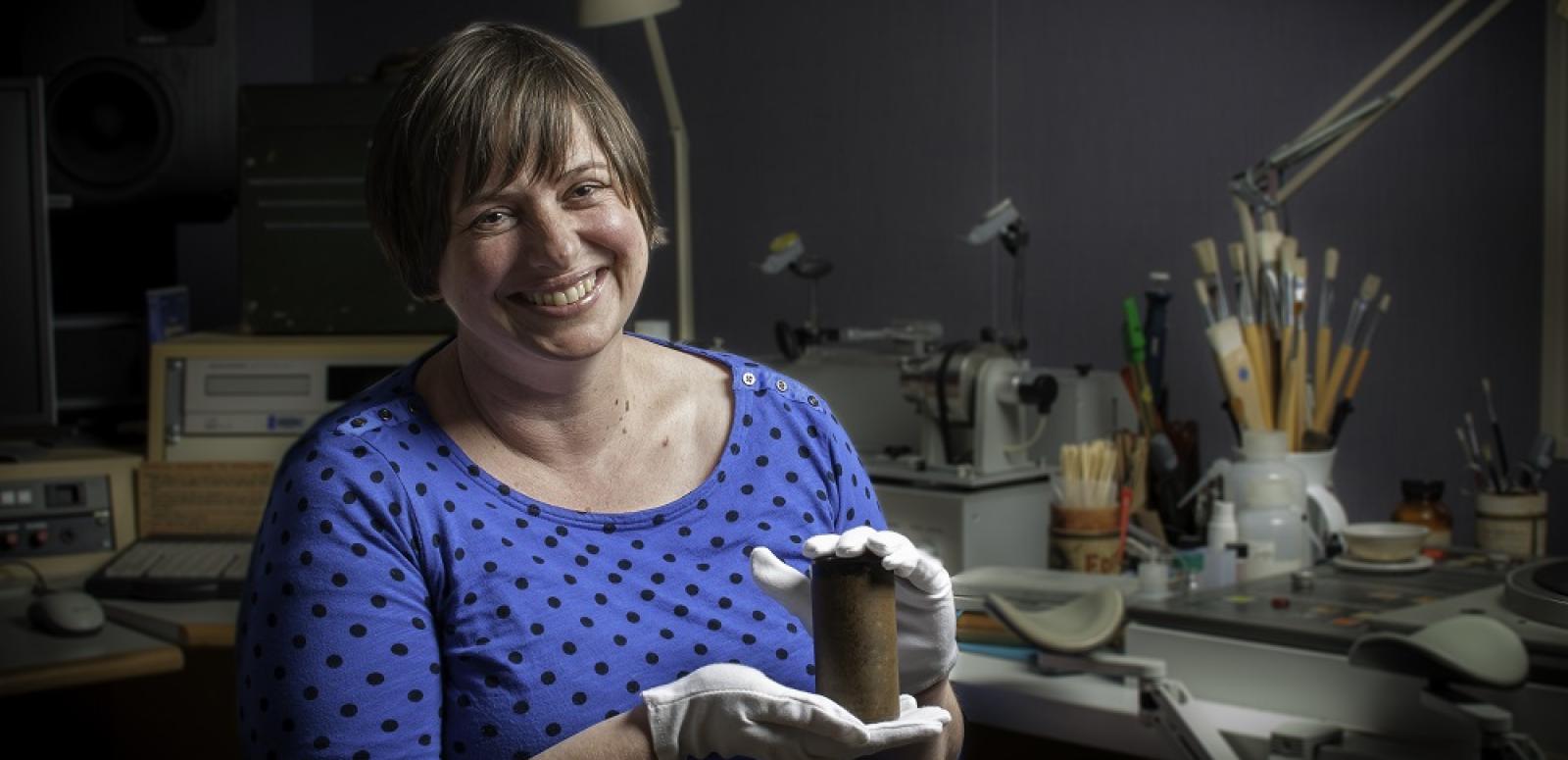
Bendigo Wax cylinder
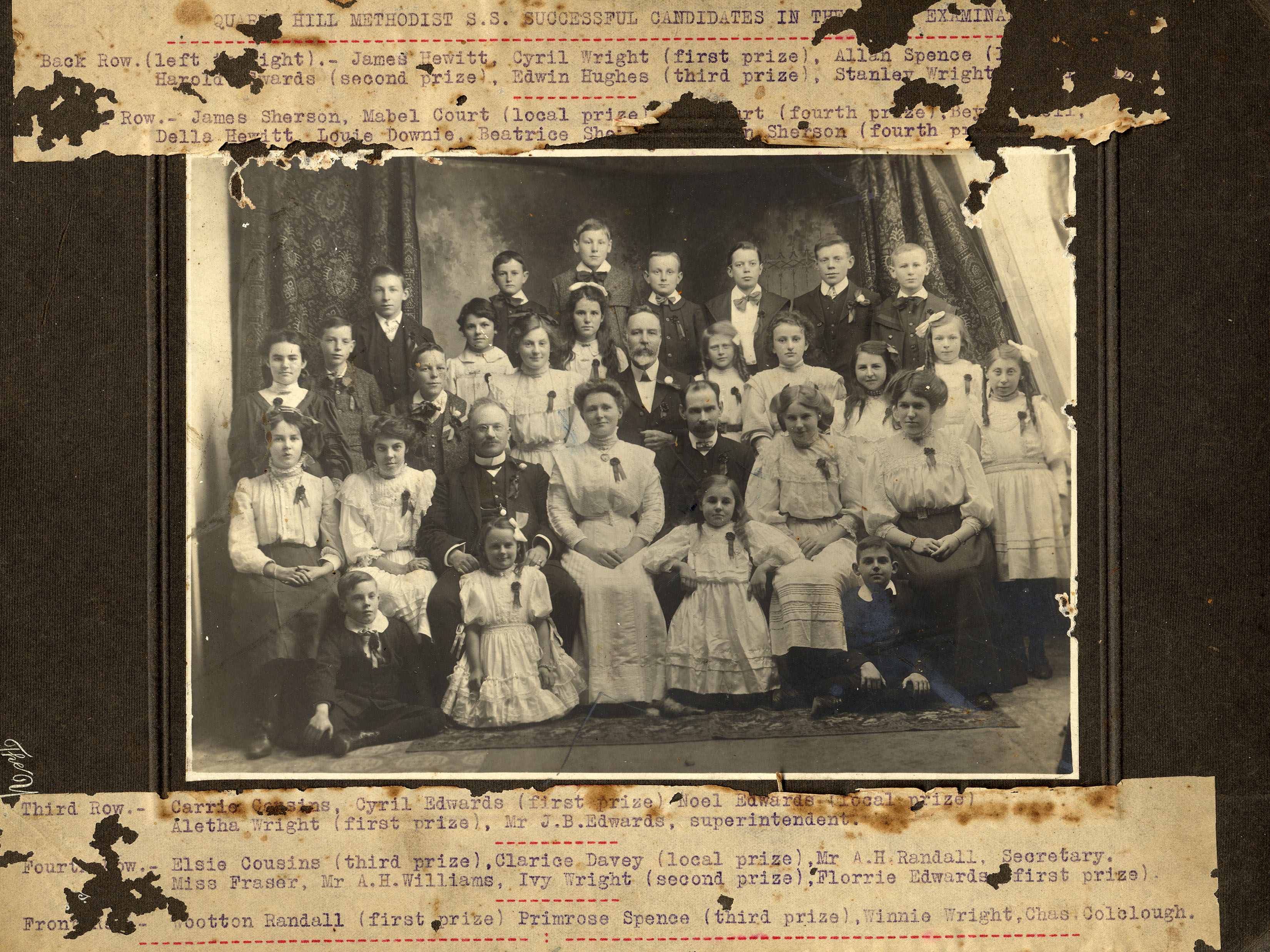
In 2012, the NFSA was contacted by Dorothy Tietze (nee Lithgow), who wished to donate a brown wax cylinder recording of a relative, Albert Henry Randall. Little was known about this home recording except that it was of Randall reading a Sunday school report in Bendigo. The cylinder had been brought to Queensland from Victoria sometime between 1904 and 1907 on a visit by Wooton and Ellen Lansell to their daughter’s family, George and Eva Lithgow.
Brown wax cylinders are incredibly fragile and could only be played a limited number of times, so not many of these early recordings still survive. This is a pity as these recordings can tell us much about the social history of this period, things that cannot be revealed in photographs or letters. Home recordings such as this one are interesting because they capture social history, the story that’s not told in the history books, giving us a more intimate picture of society.
Once the cylinder was selected for our collection, the priority was to ensure its safe arrival at the NFSA. Rather than trusting a courier, I decided to hit the road and pick it up in person from Dorothy in Queensland. The cylinder was transported in a special foam-packed suitcase to ensure its safe arrival in Canberra. I was nursing it in the car on the way to the airport like a newborn baby only to watch it bump its way down on the conveyer belt at airport security!
The condition of the cylinder was poor with large areas of mould and scuffing and light scratches on the surface. As a result, the audio quality was also poor, with Albert Randall’s voice so quiet that it was almost inaudible and there was a lot of surface noise.
The cylinder was digitised by our audio expert Gerard O’Neill, with an Archéophone (which is specially designed to copy cylinder recordings), using a Stanton 500 series 2.5 TE stylus on a flat frequency curve. One quarter the way into playing the cylinder, there was a locked groove, so a part of the recording kept playing over and over again.
Here are three versions of the digitised cylinder recording, with each recording using different levels of click and noise removal software and equalisation to reduce background noise and improve the intelligibility of Albert Randall’s voice. With more processing, the intelligibility of a recording may be improved, however the authentic characteristics of the original recording may be lost.
Albert Randall speaking at the Quarry Hill Methodist Church, Bendigo - no processing. NFSA title: 1046098
Albert Randall speaking at the Quarry Hill Methodist Church, Bendigo - medium processing. NFSA title: 1046098
Albert Randall speaking at the Quarry Hill Methodist Church, Bendigo - heavy processing. NFSA title: 1046098
In order for us to hear what Albert Randall was saying and make a transcript of his speech, Gerard made a mono copy in which he reduced the surface noise and boosted the volume of the voice. To make the transcript, I must have listened to the recording ten or 20 times with the volume turned up high, each time hearing more words or finally making sense of a phrase. Any sections of the recording that I was unsure about, I got other archivists to listen to. I find it fascinating that another person may hear or understand something that you do not.
In this recording, we hear Albert Henry Randall, secretary of the Quarry Hill Methodist Sunday School, announcing the results of the examination. He says:
'Mr Richards must be gratified at his success and has extended his favours and that of his worthy band of workers in this school. We shall proceed with the work of many scholars not connected with any school who wish to be enrolled as scholars, also any workers who will help us. We have again tendered our best thanks to all who have assisted us in the past and with confidence, rely upon them for their continued support in this great work of saving the young. In conclusion: We pray for God’s richest blessing to give to this school, and have prayed for the gift to the teachers and officers to enable them to carry on their work successfully. Officer Richards, Superintendent JB Edwards, secretary and treasurer Mr AH Randall, librarian S Smith. Teachers: Mr Baxter, Mr Jeffrey, Mr Raworth, Mr Williams, Mr Jealous, Mrs Baxter, Mrs Lancaster, Mrs Collins, Miss Fraser, organist Miss Jealous. This report is to lay down ratifying you as successful scholars, that out of 70 scholars, no less than 60 passed, one securing the possible number of marks therefore gaining the first prize for the whole of Victoria, and Tasmania. Two teachers also passed with credit, while one secured the second prize for the essay.'
Confirming the exact date of the recording proved difficult. We archivists are forever looking at terrible handwriting with a magnifying glass under a strong light for clues, but in this case, examination of the packaging failed to yield any further information.
At the start of my search, I hoped to find a newspaper article mentioning an event at the church being recorded on wax cylinder. When I realised that there was no such article, I tried to match the numbers of scholars and their examination results with information from newspaper articles of the time.
Fellow NFSA archivist, Melbourne-based Chris Arneil visited the Archives of the Synod of the Uniting Church of Victoria in an attempt to pin down the details of the recording. Thanks to his detective skills, he managed to get an approximate date: Albert Randall gave his first report as secretary of the Sunday School on 9 March 1904, so the recording must have been made on or after that date. George Baxter, who is also mentioned in the recording, passed away on 5 December 1905, which meant the recording was made sometime between March 1904 and December 1905.
In this period, attendance at Sunday school was compulsory for children of Methodist families and on graduating its senior class, they would be encouraged to become teachers or officers at the school. Sunday school was seen to have a civilising effect on the children of the goldfields.
'Through its Sunday Schools, the Church had impressed its spirit on the young, and they, with adventure in their hearts, followed the gleam of the gold, but faithfully tended the light within and let it shine out in the dark and dangerous places, for the safety of their own and the saving of others’ souls (A Century of Victorian Methodism by Reverend C Irving Benson, 1935).'
Knowledge of the scripture was taken very seriously, with students sitting for competitive examinations which pitted Quarry Hill students against students at other Methodist Sunday schools in Victoria and Tasmania.
Thanks to the kind donation of Dorothy Tietze and the expert work of the staff at the NFSA, we can relive this small but fascinating part of Bendigo’s history.
The National Film and Sound Archive of Australia acknowledges Australia’s Aboriginal and Torres Strait Islander peoples as the Traditional Custodians of the land on which we work and live and gives respect to their Elders both past and present.
